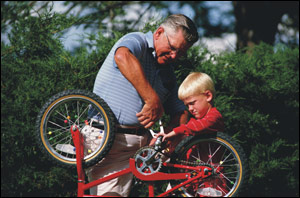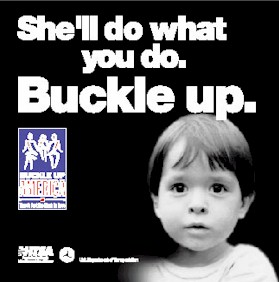
- Afghanistan
- Africa
- Budget Management
- Defense
- Economy
- Education
- Energy
- Environment
- Global Diplomacy
- Health Care
- Homeland Security
- Immigration
- International Trade
- Iraq
- Judicial Nominations
- Middle East
- National Security
- Veterans
- President's Cabinet
- USA Freedom Corps
- Faith-Based & Community Initiatives
- Office of Management and Budget
- National Security Council
- USA.gov
|
Home >
News & Policies >
Policies in Focus
|
Chapter 6. The President’s Recommendations for Avoiding Risky Behaviors
Make Healthy Choices
Background
 One of the most important things individuals and families can do to promote good health is to make smart choices. Avoiding risky behaviors such as using tobacco or drugs, or abusing alcohol - even driving without a safety belt - can save lives and improve health. Behavioral changes reduce the chance of illness or injury; even washing one’s hands regularly prevents the spread of many common illnesses and infections.
One of the most important things individuals and families can do to promote good health is to make smart choices. Avoiding risky behaviors such as using tobacco or drugs, or abusing alcohol - even driving without a safety belt - can save lives and improve health. Behavioral changes reduce the chance of illness or injury; even washing one’s hands regularly prevents the spread of many common illnesses and infections.
Misuse and abuse of alcohol continue to be a problem in this country. Alcoholic beverages supply calories but few nutrients and are harmful when consumed in excess. People who should not drink at all include children, adolescents, pregnant women, and individuals who cannot restrict their drinking to moderate levels. Having more than one drink per day for women or more than two drinks per day for men can raise the risk of high blood pressure, stroke, and some forms of cancer. American adults who drink should use alcohol responsibly in all social and recreational settings. The effects of alcohol abuse can be devastating, from adverse health consequences, to domestic abuse, to drinking and driving.
Tobacco use is the single most preventable cause of death and disease in the United States, causing more than 440,000 premature deaths annually during 1995-1999. Smoking can cause chronic lung disease, coronary heart disease, and stroke. Smoking has also been linked to cancer of the lungs, larynx, esophagus, mouth, and bladder. In addition, smoking contributes to cancer of the cervix, pancreas, and kidneys. Smokeless tobacco and cigars also have deadly consequences, including lung, larynx, esophageal, and mouth cancer. Aggressive and sustained anti-smoking programs prevent and reduce smoking and many states have successful efforts underway.
Regular marijuana use may also cause many of the same respiratory problems as regular tobacco use. Some of the respiratory problems associated with marijuana use include daily cough and phlegm, symptoms of chronic bronchitis, and more frequent chest colds. Continuing to smoke marijuana can lead to abnormal functioning of lung tissue. Research shows that marijuana harms the brain, heart, lungs, and immune system and limits learning, memory perception, judgement, and the ability to drive an automobile. Any illegal drug possession or use should not be tolerated. More parents need to learn about the power of preventing youth drug abuse.
Other simple behavioral changes save lives as well. For example, handwashing has been show to be a fundamental factor in preventing the spread of infections. One study of school children found that those who washed their hands four times a day had fewer sick days due to respiratory illness and fewer days lost because of stomach upset.
Thousands of people needlessly die in traffic accidents yearly because they do not use safety belts. Seat belts are the most effective means of reducing fatalities and serious injuries in a traffic accident. In fact, seat belts save over 10,000 lives in America every year. Appropriate bicycle safety measures could also reduce the 690 fatalities and 51,000 traffic-related injuries that occur every year. Bike helmets reduce head injury risk by 85 percent. These are smart choices Americans can make that prevent injuries and death.
The President’s Challenge:
Healthy choices are about making smart decisions in your everyday life—from avoiding tobacco and illegal drugs, to moderate consumption of alcoholic beverages if you drink, to using safety belts and bike helmets. Every little bit of effort counts:
- If you smoke, quit. If you don’t smoke, don’t start.

- If you are a parent, set a good example and quit smoking before your children start. If you continue to smoke, avoid smoking inside or around your children . Each year an estimated 3,000 nonsmoking Americans die of lung cancer and up to 300,000 children suffer from respiratory tract infections because of exposure to secondhand smoke. Evidence also indicates that exposure to secondhand smoke causes heart disease.
- Avoid illegal drugs. One of the largest factors contributing to emergency room episodes is the use of illegal drugs. In the first six months of 2001, more than 308,000 emergency room episodes were attributable to illegal drug use
- Buckle up. About 41,730 people were killed in highway crashes in 2001, down from 41,821 in 2000, but 60 percent of the people killed were not wearing safety belts.
Promoting Healthy Choices: Administration Actions
CDC Tobacco Control Toolkit--CDC is starting to develop a toolkit to accompany the 2003 annual Tobacco Control State Highlights report. This toolkit will include information and resources to assist states in developing, implementing, and evaluating programs to limit tobacco use. The toolkit will enable CDC to guide states in investing in proven programs and strategies to reduce tobacco use that have been successful in the states.
Drug-Free Communities Support Program--This program supports community anti-drug coalitions that harness local energy and resources to reduce substance abuse. Coalitions include local partnerships among youth; parents; businesses; the media; schools; youth organizations; law enforcement; civic groups; religious or fraternal organizations; health care professionals; state, local, or tribal governmental agencies; and other organizations. Activities include parent drug education programs, youth summits, drug intervention counseling services, and tutoring and financial incentives for businesses that adopt drug-free workplace programs. The President's Budget for Fiscal Year 2003 provides $60 million for the Drug-Free Communities Support Program — an increase of $10 million over 2002.
Bicycle Safety Initiatives--The National Highway Traffic Safety Administration (NHTSA) is undertaking a series of initiatives to improve public information, education, enforcement, and outreach on bicycle safety. NHTSA sponsors the National Strategies for Advancing Bicycle Safety Conference, which is a key forum bringing together policy makers, educators, advocates, transportation experts, health and injury professional and others. The Conference ensures that all interested parties agree to, and cooperate in acting upon, established goals to improve national bike safety. NHTSA also actively promotes and distributes the most recent information on helmet safety standards from the Consumer Product Safety Commission.


